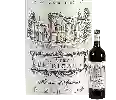
Château Clos La ChapelleCadillac Côtes de Bordeaux
This wine is a blend of 3 varietals which are the Cabernet franc, the Cabernet-Sauvignon and the Merlot.
In the mouth this red wine is a powerful with a nice balance between acidity and tannins.
This wine generally goes well with poultry, beef or veal.
Taste structure of the Cadillac Côtes de Bordeaux from the Château Clos La Chapelle
Light | Bold | |
Smooth | Tannic | |
Dry | Sweet | |
Soft | Acidic |
In the mouth the Cadillac Côtes de Bordeaux of Château Clos La Chapelle in the region of Bordeaux is a powerful with a nice balance between acidity and tannins.
Wine flavors and olphactive analysis
On the nose the Cadillac Côtes de Bordeaux of Château Clos La Chapelle in the region of Bordeaux often reveals types of flavors of earth, oak or spices and sometimes also flavors of red fruit.
Food and wine pairings with Cadillac Côtes de Bordeaux
Pairings that work perfectly with Cadillac Côtes de Bordeaux
Original food and wine pairings with Cadillac Côtes de Bordeaux
The Cadillac Côtes de Bordeaux of Château Clos La Chapelle matches generally quite well with dishes of beef, veal or game (deer, venison) such as recipes of kafta bil saniyeh (lebanese dish), white wine fondue or lamb chops marinated with herbs.
Details and technical informations about Château Clos La Chapelle's Cadillac Côtes de Bordeaux.
Discover the grape variety: Cabernet franc
Cabernet Franc is one of the oldest red grape varieties in Bordeaux. The Libourne region is its terroir where it develops best. The terroirs of Saint-Emilion and Fronsac allow it to mature and develop its best range of aromas. It is also the majority in many blends. The very famous Château Cheval Blanc, for example, uses 60% Cabernet Franc. The wines produced with Cabernet Franc are medium in colour with fine tannins and subtle aromas of small red fruits and spices. When blended with Merlot and Cabernet Sauvignon, it brings complexity and a bouquet of aromas to the wine. It produces fruity wines that can be drunk quite quickly, but whose great vintages can be kept for a long time. It is an earlier grape variety than Cabernet Sauvignon, which means that it is planted as far north as the Loire Valley. In Anjou, it is also used to make sweet rosé wines. Cabernet Franc is now used in some twenty countries in Europe and throughout the world.
Last vintages of this wine
The best vintages of Cadillac Côtes de Bordeaux from Château Clos La Chapelle are 2011, 2010
Informations about the Château Clos La Chapelle
The Château Clos La Chapelle is one of of the world's greatest estates. It offers 1 wines for sale in the of Cadillac - Côtes de Bordeaux to come and discover on site or to buy online.
The wine region of Cadillac - Côtes de Bordeaux
The wine region of Cadillac - Côtes de Bordeaux is located in the region of Côtes de Bordeaux of Bordeaux of France. Wineries and vineyards like the Château Prieuré Sainte-Anne or the Château Carignan produce mainly wines red, white and sweet. The most planted grape varieties in the region of Cadillac - Côtes de Bordeaux are Merlot, Cabernet-Sauvignon and Cabernet franc, they are then used in wines in blends or as a single variety. On the nose of Cadillac - Côtes de Bordeaux often reveals types of flavors of black fruits, citrus fruit or dark chocolate and sometimes also flavors of cocoa, chocolate or red currant.
The wine region of Bordeaux
Bordeaux, in southwestern France, is one of the most famous, prestigious and prolific wine regions in the world. The majority of Bordeaux wines (nearly 90% of the production Volume) are the Dry, medium and Full-bodied red Bordeaux blends for which it is famous. The finest (and most expensive) are the wines of the great châteaux of Haut-Médoc and the right bank appellations of Saint-Émilion and Pomerol. The former focuses (at the highest level) on Cabernet Sauvignon, the latter on Merlot.
The word of the wine: Ancestral method
A method of making certain sparkling wines such as blanquette de Limoux, sparkling gaillac or clairette de Die, which consists of a second fermentation in the bottle based on natural sugars and yeasts naturally brought by the grapes (unlike the méthode champenoise, which requires the addition of tirage liquor).








